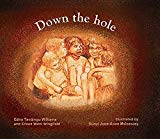
Title
Down the Hole, Up the Tree, Across the Sandhills : Running from the State and Daisy Bates
Author
Edna Tantjingu Williams
Secondary Authors
Eileen Wani Wingfield
Illustrators
Kunyi June-Anne McInerney
Publisher, Date
IAD Press (Jukurrpa books), 2000
Audience
5-8yrs, Lower Primary, Primary, Upper Primary
AC Links/EYLF
EYLF1, EYLF2, EYLF3, EYLF4, EYLF5, ACELA1426, ACELA1428, ACELT1575, ACELT1783, ACELT1580, ACHASSK011EYLF1, EYLF2, EYLF3, EYLF4, EYLF5, ACELA1426, ACELA1428, ACELT1575, ACELT1783, ACELT1580, ACHASSK011, ACHASSK012, ACHASSK013, ACHASSK014, ACHASSK015, ACHASSK016, ACHASSK017, ACAVAM106, ACAVAR109, ACPPS003, ACPPS004, ACPPS005, ACPPS007, ACELA1443, ACELA1453, ACELT1582, ACELT1584, ACHASSK028, ACHASSK029, ACHASSK030, ACHASSK031, ACHASSK032, ACHASSK033, ACPPS0015, ACPPS0017, ACPPS0018, ACPPS0019, ACPPS0020, ACPPS0023, ACPPS0024, ACELA1460, ACELA1462, ACELT1587, ACELT1589, ACELT1591, ACHASSK044, ACHASSK045, ACHASSK046, ACHASSK047, ACHASSK049, ACHASSK050, ACHASSK051, ACELA1475, ACELT1594, ACELT1596, ACELT1599, ACHASSK062, ACHASSK063, ACHASSK066, ACHASSK069, ACAVAM110, ACAVAR113, ACPPS033, ACPPS035, ACPPS036, ACPPS037, ACPPS038, ACPPS042, ACELA1487, ACELA1498, ACELT1602, ACELT1603, ACELT1605, ACHASSK088, ACHASSK089, ACELA1500, ACELA1502, ACELT1608, ACELT1609, ACELT1610, ACELT1612, ACHASSK112, ACHASSK113, ACAVAM114, ACAVAR117, ACPPS051, ACPPS053, ACPPS054, ACPPS055, ACPPS056, ACPPS058, ACPPS059, ACPPS060, ACELA1515, ACELA1518, ACELT1613, ACELT1614, ACHASSK135, ACHASSK140
ISBN
9781864650242
Language
English, Kokatha language (C3) (SA SH53-06), Yankunytjatjara language (C4) (NT SG52-16)
Add to Favourites
-
Subjects
-
Annotation
-
Teaching Resources
